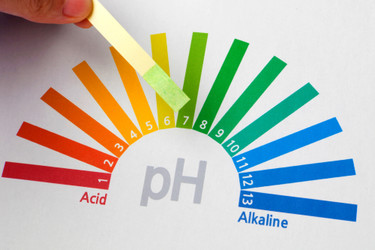Vaginal pH Balance
Posted by Wombilee on Dec 5th 2022

Your vagina is not just the muscular opening leading to your uterus but also a delicate organ that contains bacteria, which keeps it clean and healthy. The vagina is no less than a miracle, an extraordinarily intricate and enchanting part of your body with thousands of nerve endings.
Every chemical present in the universe has some pH, including all fluids of your body. pH is simply a measure of how acidic or basic a substance or fluid is. The range goes from 0-14, where 7 is the neutral range. Any number below 7 is acidic, while the digits after 7 are basic or alkaline.
In terms of chemistry, pH tells us about the presence of hydroxyl or hydrogen ions in a substance. But, in biological terms! pH helps multiple body organs fight infections, discourage contagions, and supports metabolic processes.
The vagina also has a pH, and an imbalance in the normal vaginal pH can cause severe complications!
Vaginal pH? What's the Normal Level?
Like the stomach and pancreas, your vagina also has a pH, which should range between 3.8-4.5 on a pH scale under normal circumstances. The vagina is slightly acidic during your reproductive years, but the acidity decreases as you grow old. During and after menopause, the vaginal pH may reach 5-5.5.
Your vagina produces fluids to prevent dryness and support the growth of good bacteria, which has acids in them. The bacterial flora of your vagina is responsible for stabilizing the vaginal ecosystem; thus, keeping it acidic is crucial. Vaginal pH not only supports the growth of healthy bacteria but inhibits infectious pathogens and is crucial in maintaining a healthy sexual life.
Disruption of Vaginal pH
Several factors can disrupt the normal vaginal pH, from diet to unprotected sex to washing your vagina with fragrance-based soaps; we have made a list of all the things that can cause an imbalance of your natural vaginal pH.
Douching
Cleaning the inside of your vagina with a mixture of fluids is called Douching. The vagina is a self-cleaning organ. So when the vagina is washed with pre-packaged fluid that's poured into the vagina through a tube and later squirted inside, it disrupts the normal vaginal pH and can cause infections.
Unprotected Vaginal sex
Unprotected sex can lead to several disorders, one of which is an alkaline disruption in pH. Semen. As semen interacts with the vagina, it temporarily changes the vaginal ecosystem to allow sperm to swim toward the uterus. However, the alkaline nature of the semen encourages the growth of bacteria and can cause pH disruption.
Antibiotic drugs
Antibiotics are medicines that kill bacteria; the bad part is that it kills the good bacteria too that your vagina needs. Vaginal bacteria keep the vaginal ecosystem healthy and normal, and without it, the pH balance will increase, creating an imbalance. Birth control pills also change the vaginal pH for most women. It also leads to several infections.
Menstrual periods
When the menstrual blood flows out of the vagina, it changes the pH a little because of its alkaline nature. Most women wear pads or tampons during these days, so blood is absorbed in the cotton-based period products. Because of that, vaginal pH stays basic and keeps absorbing the acidic lactobacilli bacteria until the tampon or pad is changed with a clean one or the period is over. Using a menstrual cup can substantially eliminate the risk of pH change or infections. Because of the graphene strip, Wombilee's Graphene pads also help keep your pH balanced.
Lubrication
Lubricants are widely used to reduce dryness in the vaginal walls during sex. Some lubricants and oils have a pH higher than 4.5, which can kill the healthy bacteria inside the vagina and cause infections.
Effects of Imbalanced Vaginal pH
An unhealthy vaginal pH can lead to bacterial vaginosis, yeast infections, trichomoniasis, and other severe infections. The symptoms associated with disturbed vaginal pH are as follows.
• Itching near the vagina.
• Feeling of burning during urination.
• Pungent, fish-like vaginal smell.
• Discomfort near the vagina or vulva.
• Thick yellow or green discharge.
• Pain during sexual penetration.
Fixing Your Vaginal Ecosystem
There are several tips that you can follow to ensure excellent vaginal health and normal pH, some of which are:
• Probiotics can help with a healthy vaginal pH as it encourages the growth of good bacteria in the vagina.
• The vagina is self-cleaning, so if you want to use soaps and cleaners, make sure it's gynecologist-approved. Avoid douching or using any chemicals.
• Yogurt is a good source of Lactobacillus, the vaginal bacteria that helps maintain the pH balance.
• Regular inspection and examinations by your OB-GYN can eliminate the risk of infection.
• Avoid sugar-based products and processed food. It not only disrupts vaginal pH, but it also causes infections.
• Tight clothing reduces air circulation. Hence wearing loose and cotton-made clothes can help maintain the pH of your vagina.
• Use condoms during sex. It protects you from STDs and infections and keeps your vaginal ecosystem healthy.
• Using menstrual cups and Wombilee Graphene pads helps balance the vaginal pH.
• Hormone replacement therapy also helps in keeping the vagina healthy.
Wombilee: The pH Balancing Menstrual Pads
Wombilee pads have an organic surface and wings; they are without chemicals such as chlorine, dyes, and pesticides, which makes them what a woman needs during menstruation. However, the graphene strip in Wombilee pads makes it much better than other brands currently sold in the market.
The graphene strip destroys the bacterial cell membrane and inhibits the growth of toxic and harmful bacteria. It helps with circulatory health, metabolism, and cell activity, which helps maintain the pH of your vagina.
Wombilee's pads are anti-static and conductive, meaning they help to prevent skin infections and itching. Also, with the perforated top and back layer, the pads are breathable and flexible, allowing you to perform all typical functions without any leakage stress.
To Remember!
The vagina is a relatively soft organ, and keeping it safe and healthy is essential. You can inspect your vaginal pH using a home kit or visit your doctor for regular checkups. Eat healthily, drink lots of water, and exercise regularly. In case of burning, itching, or any other symptoms, we suggest you consult an OB-GYN for treatment.

